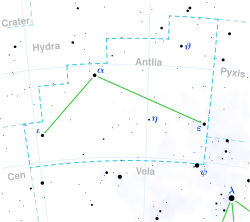Top Qs
Timeline
Chat
Perspective
Iota Antliae
Star in the constellation Antlia From Wikipedia, the free encyclopedia
Remove ads
Iota Antliae is a single,[9] orange-hued star in the southern constellation of Antlia. Its identifier is a Bayer designation that is Latinized from ι Antliae, and abbreviated Iot Ant or ι Ant, respectively. It has an apparent visual magnitude of +4.60,[3] making it a faint naked eye star. From parallax measurements, the distance to this star can be estimated as 208 ± 2 light-years (63.64 ± 0.5 parsecs). It is drifting further away with a radial velocity of 2 km/s.[2]
The spectrum of Iota Antliae matches a stellar classification of K1 III,[5] indicating that this is an evolved star that is now in its giant phase. Having exhausted the supply of hydrogen at its core, the star has expanded and it now spans 11 times the radius of the Sun.[6] It is a red clump giant, indicating it is on the horizontal branch and is generating energy through helium fusion.[4] The star is 3.32[7] billion years old with 1.55[7] times the Sun's mass. It is radiating 58[6] times the luminosity of the Sun from its swollen photosphere at an effective temperature of 4,892 K.[10]
Remove ads
Planetary system
Two super-Jovian planets around Iota Antilae (or HD 94890), detected by the radial velocity method, were reported in 2025.[6]
Remove ads
References
Wikiwand - on
Seamless Wikipedia browsing. On steroids.
Remove ads

